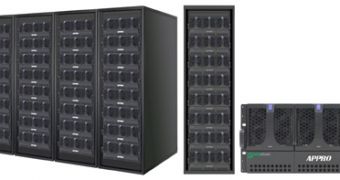Appro, a leading provider of supercomputing solutions, has recently announced a new product that has been specifically designed to combine the performance capabilities of NVIDIA's Tesla GPUs with the features and performance of Intel's latest Nehalem-based Xeon processors. The new solution, dubbed Appro HyperPower Cluster Solution, has been designed to accommodate the requirements of business users and deliver Teraflop performance. With the launch of the new Appro HyperPower Cluster Solution, the system vendor also announced a discount for Universities.
Appro's product has been designed to provide a scalable computing architecture that features the company's high-density servers combined with an equal number of NVIDIA Tesla S1070 servers. This system is meant to execute thousands of concurrent throughput parallel processing threads for mathematically intensive problems, according to the company.
“HPC standards-based cluster architectures have propelled the HPC market's skyrocketing growth in recent years and drove HPC revenue past $9 billion in 2008. HPC buyers are always looking for ways to increase the performance on their codes in a cost-effective way, so the use of hybrid designs that combine standard CPUs with GPUs, accelerators and FPGAs are being explored to increase performance on key codes,” said Earl Joseph, IDC program vice president, Technical Computing Systems. “Appro HyperPower Cluster addresses this growing market requirement with its new GPU hybrid processing solution that can execute thousands of concurrent throughput parallel processing threads, pushing science and research projects to the next level of computing.”
According to the specifications of the new Appro HyperPower Cluster, users will be able to take advantage of up to 304 CPU cores and 18,240 GPU cores, a solution that can deliver up to 78 TeraFLOPs of single precision GPU performance. In addition, the integration of NVIDIA's Tesla GPUs enables this cluster solution to deliver more computing power in a denser architecture and at a lower cost, when compared to CPU-only clusters.
The new system from Appro is designed for HPC markets including government, academia and industry.

 14 DAY TRIAL //
14 DAY TRIAL //